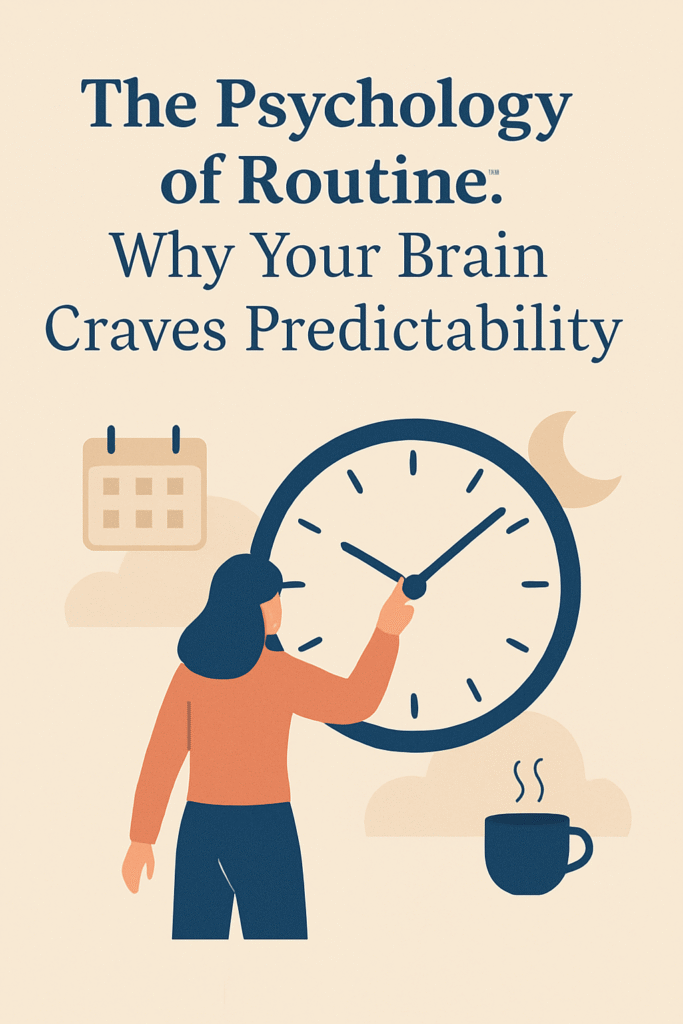Explore the psychology of routine and discover why your brain thrives on predictability. Learn how consistent habits can boost focus, reduce stress, and improve mental health.

In a fast-paced world filled with unpredictability and chaos, routines offer a sense of control, calm, and clarity. But there’s more to it than just comfort—your brain is biologically wired to seek patterns and repetition. Let’s dive into the psychology of routine and why predictable habits can transform your mental and emotional well-being.
Table of Contents
🧠 Why the Brain Craves Routine
Your brain is a pattern-seeking machine. It looks for structure to conserve energy, reduce uncertainty, and stay safe🔄 1. Routines Reduce Cognitive Load
Every decision uses up mental energy. By automating tasks—like your morning routine or bedtime ritual—your brain frees up space for creativity, focus, and problem-solving.
Fun Fact: Studies show that decision fatigue can impair judgment and self-control, especially later in the day.
(Source: Baumeister et al., 2010)
😌 2. Predictability Lowers Anxiety
Uncertainty triggers the brain’s threat detection system. Predictable routines offer psychological safety by providing a reliable framework in an otherwise chaotic world.
🛌 3. Routine Supports Better Sleep
A consistent wind-down routine signals the brain to shift into rest mode. This helps regulate circadian rhythms, improve sleep quality, and reduce insomnia.
🧩 4. Habits Shape Identity
Doing something repeatedly—like journaling, exercising, or meditating—reinforces the identity of the person you want to become. You start to believe:
“I’m someone who follows through.”
💡 The Mental Health Benefits of Routine
- Reduces stress and anxiety
- Boosts focus and productivity
- Improves emotional regulation
- Promotes better sleep and energy balance
- Provides structure during difficult times (e.g., grief, depression, burnout)
Routines act like anchors—keeping you grounded even when life feels overwhelming.
🛠️ How to Build a Brain-Friendly Routine
✅ 1. Start Small
Focus on one or two keystone habits like a morning walk or a digital-free wind-down.
🕰️ 2. Stay Consistent, Not Perfect
Habits don’t require perfection—just repetition. Aim for consistency, even if it’s just 5 minutes.
📱 3. Use Cues and Triggers
Tie a habit to an existing cue (e.g., “After I brush my teeth, I’ll journal for 2 minutes”).
✍️ 4. Track and Reflect
Use habit trackers or journaling to celebrate progress and notice patterns in your energy and mood.
📦 5. Declutter Your Day
Limit decision fatigue. Simplify meal planning, wardrobe choices, or your digital space.
📋 Sample Daily Routine for Mental Clarity
Morning:
- Wake up at the same time daily
- Hydrate + light movement
- Set 1–3 clear priorities
Midday:
- Take mindful breaks
- Eat lunch away from screens
Evening:
- Digital detox 1 hour before bed
- Reflect + journal wins or lessons
- Sleep ritual (stretch, tea, soft lighting)
📣 Final Thoughts: Predictability is Power
Routines aren’t boring—they’re brain-boosting frameworks that reduce stress, boost mental clarity, and create space for growth. The key is to design routines that feel grounding—not rigid.
📌 Key Takeaways
- Your brain thrives on predictability and pattern
- Routine reduces stress, decision fatigue, and anxiety
- Start small, stay consistent, and tailor your habits to support well-being